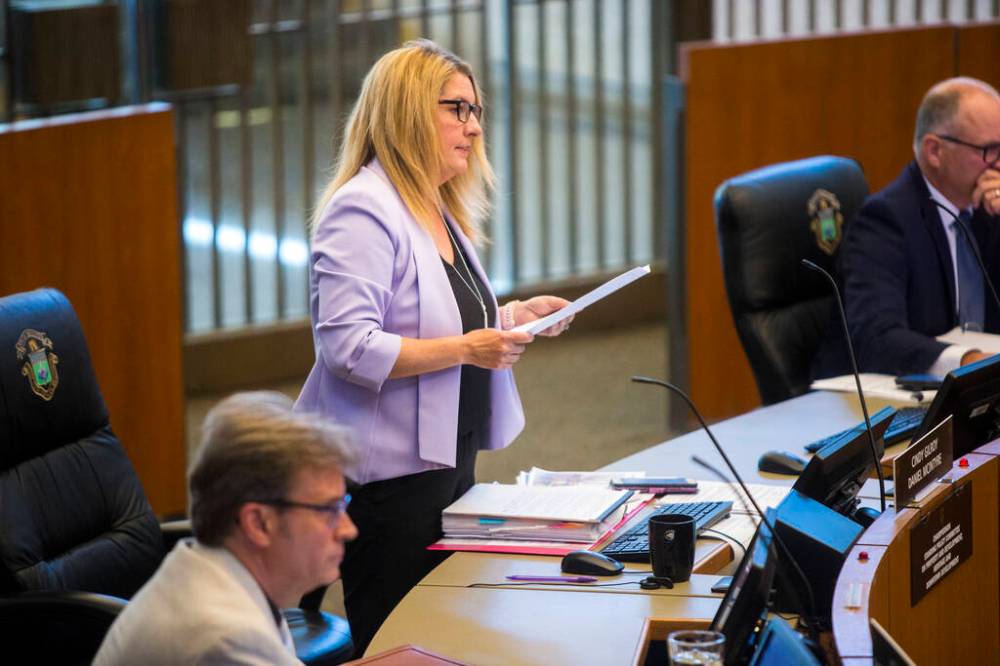City applauded for affordable housing plan
Advertisement
Read this article for free:
or
Already have an account? Log in here »
To continue reading, please subscribe:
Monthly Digital Subscription
$1 per week for 24 weeks*
- Enjoy unlimited reading on winnipegfreepress.com
- Read the E-Edition, our digital replica newspaper
- Access News Break, our award-winning app
- Play interactive puzzles
*Billed as $4.00 plus GST every four weeks. After 24 weeks, price increases to the regular rate of $19.95 plus GST every four weeks. Offer available to new and qualified returning subscribers only. Cancel any time.
Monthly Digital Subscription
$4.99/week*
- Enjoy unlimited reading on winnipegfreepress.com
- Read the E-Edition, our digital replica newspaper
- Access News Break, our award-winning app
- Play interactive puzzles
*Billed as $19.95 plus GST every four weeks. Cancel any time.
To continue reading, please subscribe:
Add Free Press access to your Brandon Sun subscription for only an additional
$1 for the first 4 weeks*
*Your next subscription payment will increase by $1.00 and you will be charged $16.99 plus GST for four weeks. After four weeks, your payment will increase to $23.99 plus GST every four weeks.
Read unlimited articles for free today:
or
Already have an account? Log in here »
Hey there, time traveller!
This article was published 11/02/2022 (1440 days ago), so information in it may no longer be current.
NEW grants to entice the creation of affordable housing units could soon be available in Winnipeg.
A proposed tax increment financing policy aims to support the construction of 1,500 affordable housing units in the city, while setting other key development targets, pending council approval.
The pandemic has exacerbated the need for lower-cost housing options, said Coun. Cindy Gilroy, who leads council’s property and development committee.

“We just have to look around downtown to know how important that it is that we create affordable housing here in Winnipeg,” said Gilroy.
In recent months, many vulnerable Winnipeggers have sought shelter in bus shacks or encampments.
The proposed grants would refund up to 80 per cent of the municipal portion of property taxes for eligible affordable housing projects. That benefit would also apply to heritage building restoration and rehabilitation projects; economic development initiatives (such as the redevelopment of downtown surface parking lots and brownfield sites); and “transformative developments.”
Brownfield sites are defined as former commercial sites that could require groundwater and/or soil remediation, while transformative developments are those that improve significant private buildings or public infrastructure in a targeted area.
The affordable housing tax breaks would last up to 25 years for downtown and “housing improvement zone” projects. Non-profit projects that house vulnerable people outside those areas would get the same extended tax break, while the credit would last up to 15 years for other projects outside the target areas.
Gilroy said the citywide scope for the financing would prevent low-income residents from being forced to live in a limited number of neighbourhoods.
To be eligible for the housing grants, at least 30 per cent of a project’s rental units must have rents set at less than 80 per cent of the median market rate.
An organization that aims to provide affordable homes to low-income tenants welcomed the proposal.
“When you are building affordable housing units, especially apartment buildings, the process of cobbling together money and funding and making the numbers work is, frankly, a bit of a nightmare. So anything that the city does to bring down the cost per unit at all is hugely valuable,” said Mary Agnes Welch, chairwoman of the board for the Westminster Housing Society.
Welch said the grants would help ensure a project is viable at reduced rents.
The policy would provide up to $50 million worth of grants for affordable housing, including $20 million earmarked for downtown. Another $20 million worth of grants would be available to support economic development initiatives and heritage buildings.
Tax breaks would last up to 25 years for some “transformative developments,” or up to 10 years for all other categories.
Transformative developments must involve a minimum of $100 million of capital investment, which could include a redevelopment of the downtown Hudson Bay Building or the Portage Place Mall.
“When we have empty buildings, it’s not good for any of us. So (this is about) making sure that they’re filled, it’s making sure that people are living down there, it’s making sure that we have businesses that can also succeed in our downtown,” said Gilroy.
While the plan would see council waive considerable tax dollars, the head of council’s finance committee noted it would still create some tax revenue, along with developments that may otherwise not get built.
“This policy has to (consider) the broader needs of investment to transform the city and to transform the city’s downtown,” said Coun. Scott Gillingham.
joyanne.pursaga@freepress.mb.ca
Twitter: @joyanne_pursaga

Joyanne is city hall reporter for the Winnipeg Free Press. A reporter since 2004, she began covering politics exclusively in 2012, writing on city hall and the Manitoba Legislature for the Winnipeg Sun before joining the Free Press in early 2020. Read more about Joyanne.
Every piece of reporting Joyanne produces is reviewed by an editing team before it is posted online or published in print — part of the Free Press‘s tradition, since 1872, of producing reliable independent journalism. Read more about Free Press’s history and mandate, and learn how our newsroom operates.
Our newsroom depends on a growing audience of readers to power our journalism. If you are not a paid reader, please consider becoming a subscriber.
Our newsroom depends on its audience of readers to power our journalism. Thank you for your support.

